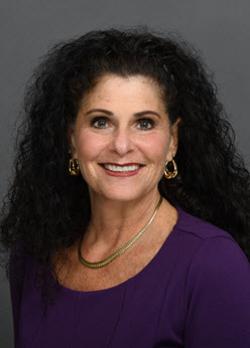

 |
||
|
Associate Dean for Student Affairs and Associate Professor of Clinical Radiology
School of Medicine
Beginning her teaching career at NYMC in 1996, Susan Rachlin, M.D., FACR, associate dean in the Office of Medical Student Affairs and associate professor of clinical radiology, has been awarded a teaching award from students every year since. She is currently a member of the College’s elite ranks of the Robert Goldstein, M.D. Society, a privilege reserved for faculty members who have been honored with Excellence in Teaching Awards for more than ten years. As she looks back on her distinguished career in academic radiology, including caring for thousands of patients, having her students recognize her devotion to their education at NYMC is still her greatest source of pride.
You have been teaching at NYMC for 22 years. What do you consider NYMC’s greatest asset for its students?
Our greatest asset is the fact that we are a community. We try our best to make the school and the campus feel like a home. And, as a result, I think NYMC School of Medicine students are very well supported from the moment they enroll until long after they graduate.
What motivated you to pursue a career in medicine?
Very early on, I was influenced by an older cousin of mine who was a radiologist. She once took me to the hospital and showed me the x-ray of another cousin of ours who had fallen. I can still recall the image of a broken collarbone on the x-ray. I went home and told my mother I wanted to be a radiologist. And this was at only ten years old!
But even back then, I remember being equally interested in teaching as I was in medicine. So it was another memorable moment when I realized that I could do both. During my first year of medical school, I remember sitting in the lecture hall and being completely inspired by one of my radiology professors, Dr. Lucy Frank Squire—a wonderful teacher. After seeing her teach in a way that I had never seen—with such total devotion to her students—I knew academic radiology had to be a huge part of what I did in my career, and made the decision early on to always stay involved with medical students.
What do you consider the most fascinating part of your job?
That is an easy question to answer: it’s working with the students every day. I talk to students about everything and anything—it can be academic issues, personal issues, or health issues. No topic is off limits. Whether it be advising students as one of their associate deans; working with students who are assigned to The Wright House where I am advisory dean, or in the capacity of educating them during the coursework, there is nothing more interesting or satisfying to me than our students.
What achievement have you been most proud of during your time at NYMC?
I think it’s recognition by the students with the Excellence in Teaching Awards. It is a great source of pride and I am honored. Also, and perhaps just as important, was to be recognized by the students for humanism and devotion to patients with the Leonard Tow Humanism in Medicine Award. The role I have been able to play in students’ and residents’ lives over the years has probably been what has been most gratifying.
Who has had the biggest influence on your career?
I mentioned earlier that one of my first-year radiology professors, Dr. Lucy Frank Squire was my greatest influence. Dr. Squire was a noted radiologist, medical educator and mentor who was the first woman to be enrolled as a resident in Massachusetts General Hospital’s radiology program.
What do you see as the greatest challenge facing medical students as they prepare for their future practicing medicine?
Health care is changing, and will likely continue to change. As it does, I think it’s important for the students to stay true to the ideals that originally drove them to want to become physicians, and to continue to strive to deliver compassionate and humanistic care. As they move on to their careers—and especially as health care continues to evolve—it will become even more important for them to serve as a voice and an advocate for their patients.
What is the most important piece of advice you can give incoming SOM students?
NYMC is a truly wonderful place to receive your medical education, and we consider it an honor and a privilege to help you achieve your goals. And while medical school is a long and sometimes arduous journey, it is a road that is well worth traveling. The rewards that you receive as a physician—being able to help another person in their time of need—is worth all the long hard hours of studying that it takes to get there.
What advice would you give graduating SOM students?
My advice would begin with a question: What is a doctor? There are many answers, but the one I share most often with our graduates is as follows:
A doctor is a person who is a healer not only of the body but of the soul as well. It is a sacred and noble profession. Patients place their trust in us, they look up to us, and they rely upon us to help them during all aspects of their lives. A doctor must be a person who will exhibit kindness, empathy, compassion and act as an advocate for their patients. A doctor should be the person who provides a voice to those too sick or unable to speak for themselves. Being a doctor is a great and wonderful gift. Always cherish the fact you are able to make a difference in a person’s life.